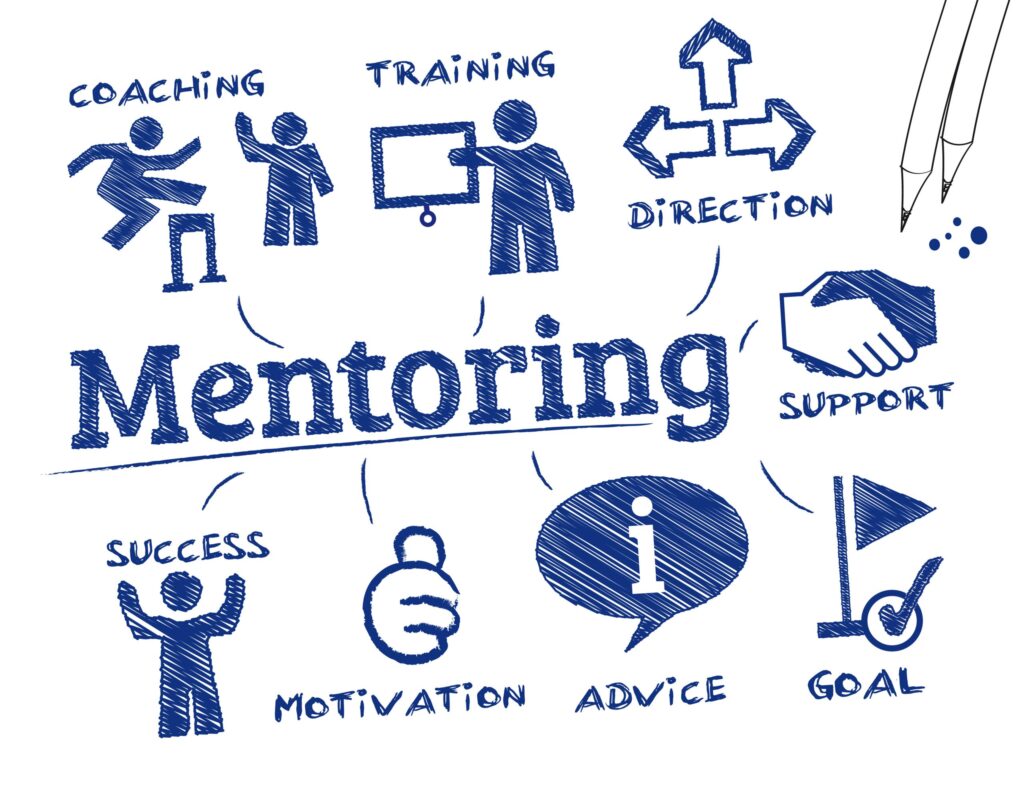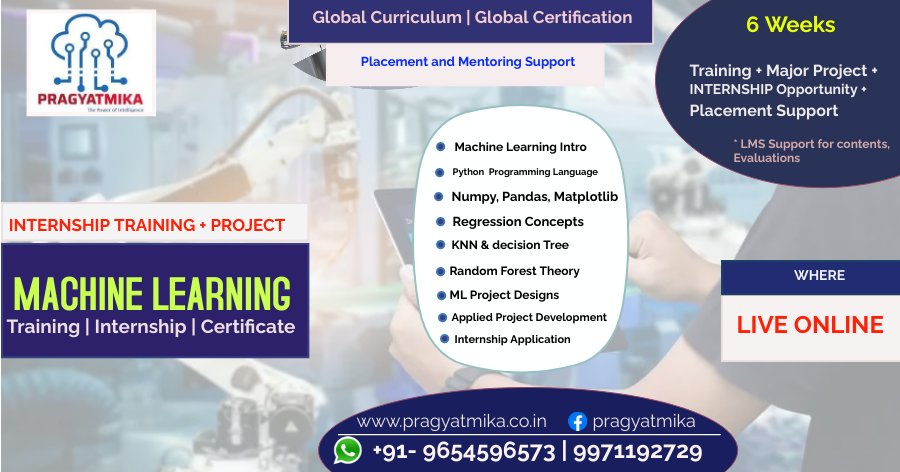Python Language | Machine Learning | Project | Internship | Global Certification
*Intermediate * 6 Weeks * Online LIVE * Hands ON * Post Training Support
Learn to transfer the Human Intelligence into Machines so that they can work like as a human being.
Course Overview:
Machine Learning typically involves a structured approach to teach individuals the principles and practices of integrating intelligent derivation algorithm with Machines /Computers to behave it like a Human.
The demand for machine learning engineers is skyrocketing, leading to high salaries. The demand for machine learning skills continues to rise across finance, healthcare, retail, and technology industries. Job postings related to AI and machine learning are on the rise, indicating the growth potential of this field. As you become a machine learning engineer, the average salary in India is around INR 1,200,000 per year.
INTERNSHIP TRAINING Program in MACHINE LEARNING equips participants with the knowledge and skills required to apply machine learning techniques effectively to solve real life problems. This includes understanding algorithms, working with data, and building models to solve real-world problems. After the completion of program you are eligible for Internship Certificate in Machine Learning, ML Application Project, NOCN APD Certification (Optional) , Placement & Mentoring Support.
Course Topics :
1. Introduction to Machine Learning
- Concepts:
- What is Machine Learning (ML)?
- Differences between ML, AI, and Data Science
- Types of Machine Learning: Supervised, Unsupervised, and Reinforcement Learning
- Goals:
- Provide a foundational understanding of ML concepts and terminology.
2. Mathematics and Statistics for Machine Learning
- Concepts:
- Linear Algebra: Vectors, Matrices, and Operations
- Calculus: Derivatives and Integrals (for understanding optimization)
- Probability and Statistics: Distributions, Hypothesis Testing, and Regression
- Goals:
- Develop a mathematical foundation to understand and implement ML algorithms.
3. Data Handling and Preprocessing
- Concepts:
- Data Collection: Sourcing and Gathering Data
- Data Cleaning: Handling Missing Values, Outliers, and Noise
- Feature Engineering: Selecting and Creating Features
- Goals:
- Learn how to prepare and preprocess data for ML tasks.
4. Exploratory Data Analysis (EDA)
- Concepts:
- Visualization Techniques: Histograms, Scatter Plots, Box Plots
- Descriptive Statistics: Mean, Median, Standard Deviation
- Correlation and Patterns
- Goals:
- Understand and visualize data to uncover insights and guide modeling decisions.
5. Supervised Learning
- Concepts:
- Regression: Linear Regression
- Classification: Logistic Regression, Decision Trees, Random Forests, Support Vector Machines
- Model Evaluation: Accuracy, Precision, Recall
- Goals:
- Implement and evaluate various supervised learning algorithms for prediction and classification tasks.
6. Unsupervised Learning
- Concepts:
- Clustering: K-Means, Hierarchical Clustering, DBSCAN
- Dimensionality Reduction: Principal Component Analysis (PCA), t-SNE
- Association Rules
- Goals:
- Apply unsupervised techniques to discover hidden patterns and relationships in data.
7. Introduction to Deep Learning
- Concepts:
- Neural Networks: Perceptrons, Multi-Layer Perceptrons
- Deep Learning Frameworks: TensorFlow, Keras, PyTorch
- Architectures: Convolutional Neural Networks (CNNs), Recurrent Neural Networks (RNNs)
- Goals:
- Understand and build basic deep learning models for complex data like images and sequences.
8. Model Evaluation and Tuning
- Concepts:
- Hyperparameter Tuning: Grid Search, Random Search
- Cross-Validation: K-Fold, Leave-One-Out
- Model Selection: Bias-Variance Tradeoff
- Goals:
- Learn how to optimize and validate machine learning models to improve performance.
9. Deployment and Production
- Concepts:
- Model Deployment: APIs, Web Services
- Monitoring and Maintenance: Performance Tracking, Updating Models
- Tools: Docker, Flask, Cloud Platforms (AWS, Azure, Google Cloud)
- Goals:
- Gain practical experience in deploying and maintaining machine learning models in production environments.
10. Capstone Project
- Concepts:
- End-to-End Project: Define a problem, collect data, build and tune models, deploy
- Presentation: Communicate findings and solutions effectively
- Goals:
- Apply all learned concepts to a real-world problem and demonstrate your capabilities.
Program Highlights:
- Live Instructor Led Training with unlimited access of Recorded Videos library for revision.
- 100% Practical Oriented Course.
- Coding Support Available for individuals.
- Trainers and Training from Real Industry Environment
- Frequent Industry Interaction, Access to Design House and Software companies Conferences and Technical events.
- Selected participants get opportunity to work on Live Industry Projects as Intern after the program.
- PRAGYATMIKA Club Membership for 6 Months for Support, Guidance, Handholding and Mentorship.
- Exercises , Evaluations , Mini projects , Projects all during the program.
Schedule of Session:
- The Program is delivered Online LIVE for6 WEEKS Duration.
- The Sessions are Scheduled are scheduled Five Days in a Week (MON,TUE,WED,THU,FRI).
- The Average duration of Session is 90 –120 Minutes.
Unique Benefits of Enrollment:
- Live Training through the Faculties already working in the AI & Data Science Domain.
- Free Access to Video Contents, Design Documents, Technical Manuals, Notes , etc. During and Post completion of Training
- LIVE Technology support through a dedicated Technology Support Help Desk post training Till 6 months.
- Free Access to PRAGYATMIKA VIP Network for Lifetime for Networking with Same domain Professionals.
- Vendor Identification Support to build your Supply Chain Network.
- Hands On Training Approach with Learn from your Own Place Facility.
- Global Certification earning Opportunity recognized world wide professional organizations.
- Career and Mentoring Support.
Delivery Mechanism:
- Online LIVE Sessions.
- Remote IDE access for LIVE Hands ON.
- Recorded Videos of Session after each session.
- E-Notes.
- Continuous Evaluation and Grading.
- Internship Project.
- Dual Certification (Training and Project).
Session Structure and Outcome:
- 250+ Hours of Total Learning
- 100 Hours of Project Implementation.
- Post Training Query Resolution and Support.
- Post Training Industry Interaction Facility.
- Industry Internship Opportunity.
Need A Support
Our Support Strategy:

- Industry Qualified Mentors and continually updated Curriculum.
- Freedom of Learning from Anywhere , Anytime with guided Support
- Access to exclusive Wiki on IoT, LIVE Chat Support from Faculty and Design House Interactions.
- Personalized Expert suggestions, Feedback and solutions understanding your industry scenario and requirements.
- PRAGYATMIKA Community Support and VIP Network Access for Latest Trends in Industry, Technology Webinars, Peer Support, Industry Insights and knowledge Sharing.
- Expert Mentoring and Support on Short term and Long Term Career/ Entrepreneurial Goals.
- International Certifications for access to Overseas career opportunities.
- Handy Tips and Risk Analysis before starting your own venture.
Register for the Program
Testimonials from our Learners:



Disclaimer:
PRAGYATMIKA holds the right to make the modification/change/cancel the program contents, program trainers, event dates or events anytime without prior notification or information.


